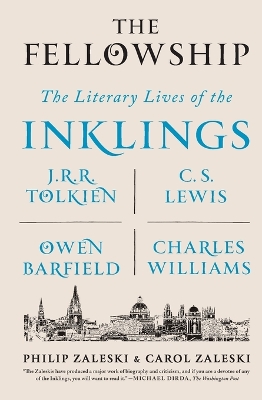Reviewed by Briana @ Pages Unbound on
Despite the promise of four Inklings, the focus is truly on Lewis and Tolkien. Charles Williams does not even appear in the book until after page 200, and 100 pages later, he’s dead. (Not his fault he died fist, though, I suppose.) Owen Barfield is a little more present, but he never gets as much attention as the two other authors. This spotlight on Lewis and Tolkien is, on one hand, understandable; they’re the two most famous Inklings, and readers who pick up the book are likely to have the greatest interest in them. However, one would assume part of the appeal of a book about “the Inklings” more generally would be that it would tell readers about the Inklings they don’t already know much about. (As a bonus, readers do get to learn a lot about Lewis’s brother Warnie, also an Inkling and a respected academic in his own right, but perhaps doomed to be always known as “C.S. Lewis’s brother.”)
My real frustration with the book, however, is that the authors consistently impose their personal opinions and interpretations. There are numerous offhand comments about people’s characters, without much backing evidence, as well as blithe declarations that, for example, a certain work is obviously the author’s weakest novel. There could be reasonable explanation for these judgments. Perhaps literary scholars in general think x is author y’s weakest novel. However, the Zaleskis’ failure to back up many of their claims is a recurring issue in the book.
I also think it worth mentioning that the book could be a bit of a slog for readers without some knowledge of literary theory, religion, and philosophy. It is, admittedly, unclear who the target audience of this book might be. It seems to be marketed to a general audience, but one assumes anyone who actually picks up a 600+ page tome classified as “biography/religion/literary criticism” is going to have some background knowledge on the subject matter and not be a complete novice. However, the authors frequently refer to theories, scholars, and other movements in various academic fields without any explanation of what they are or why they are important. I did alright reading the book, but I credit that with having a graduate degree in English literature; I admit to being somewhat lost when it came to some of the religious studies references. The book is not impossible to read, but some readers may do well to have Google handy.
These flaws aside, the book does offer an immensely thorough look at how these four men influenced each other’s writing and how their faith and their scholarly interests pervade all of their writing. Readers may already be aware that Tolkien was an active Roman Catholic or that Lewis became known for his Christian apologetics work. However, what the Zaleskis clearly show is how each of the four men’s faith changed over time and how certain movements, beliefs, and struggles might have colored their work over their entire lifetime—how Lewis moved from essentially pagan views in his early poetry to become the Christian voice of a nation, for instance.
I would warn off readers who feel the need to idolize their authors. Personally, I think Tolkien’s private life is the only one that comes across as admirable here, even though he himself felt he may never have devoted as much time to his family as he would have wished. However, the contradictions add a layer of interest to the work, as readers must ponder how Lewis could espouse Christian teaching while living with an older, married woman for the majority of his life (critics are unclear whether the relationship was sexual), or how Williams could justify his ideas of pure love leading to virtue while engaging in multiple affairs (never sexual, as though that excused them). But the point is that these were all real men, all struggling to refine their beliefs and their own behavior, even as they sought to illuminate some type of truth through their writing. They were never perfect, but they all thought deeply about what perfection might look like.
Despite my issues with The Fellowship, I did find it a worthwhile read. I learned a number of new things about all four of the authors, and the intersections drawn between them were immensely helpful. I recommend it to Inklings fans serious about learning more about their lives and work.
Reading updates
- Started reading
- 23 August, 2017: Finished reading
- 23 August, 2017: Reviewed
